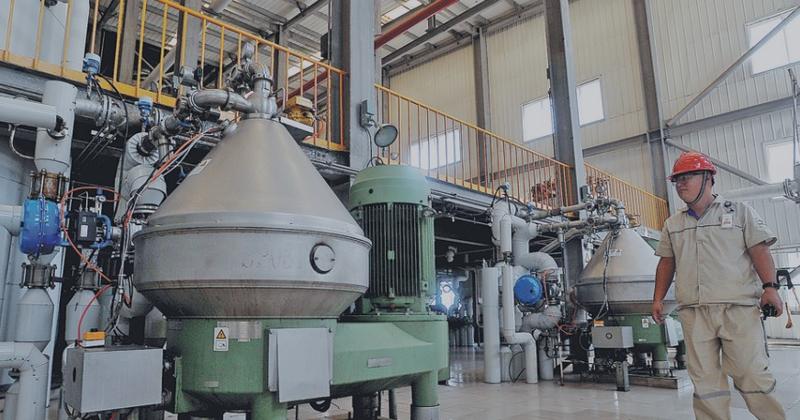Agricultural produce trader's expansion into value-added areas to be gradual before 2025
 In this undated file photo, an employee oversees production at an LDC facility in Tianjin. (PHOTO PROVIDED TO CHINA DAILY)
In this undated file photo, an employee oversees production at an LDC facility in Tianjin. (PHOTO PROVIDED TO CHINA DAILY)
Louis Dreyfus Co, one of the world's major agricultural goods traders and processors by sales revenue, will invest US$300 million in China gradually before 2025 to move further downstream into more value-added areas, said its senior executives.
We believe China's economic growth will continue, that the country will continue to be a driver of global economic recovery, and that China will continue to offer unprecedented opportunities for global investors.
James Zhou, chief commercial officer of Louis Dreyfus Co and head of Asia region
In addition to sealing deals worth US$2.4 billion with Chinese partners to bring agricultural products to the country during the third China International Import Expo, the Netherlands-based group has sewn up plans to invest in areas including New Retail, farm acquisitions and the production of aquatic feed in China during the 14th Five-Year Plan period (2021-25).
Michael Gelchie, CEO of LDC, said the rapid recovery of the Chinese consumer market, the emergence of the New Economy sectors and the rise of novel business models reflect China's resilience and bright future prospects.
ALSO READ: Ensuring food security via win-win trade
All of these are strengthening the determination of foreign investors such as LDC to grow in China, he said.
"Our objective is to continue to rebalance our portfolio and increase our crushing capacity to reinforce our strategic road maps, through collaborations with partners to move further downstream into value-added areas over the next five years."
Despite the impact of COVID-19, LDC signed new cooperation contracts with domestic companies in Jiangsu, Guangdong and other provinces to date this year.
For example, its agreement with long-term local partners River &Ocean Cereals and Oils (Jiangsu) Ltd aims to build a new oilseeds crushing facility in Zhangjiagang, Jiangsu province.
The new plant will double its capacity to supply soybean meal and refined vegetable oils to eastern China. The current daily capacity is 7,500 metric tons of meal and oil.
ALSO READ: China will ensure food security at all costs
Gelchie said he believes the global economic slowdown caused by the pandemic will be temporary. Open, win-win international economic and trade cooperation remains essential for global economic development. LDC therefore hopes that the international community will maintain friendly and open dialogue, promote exchanges, enhance understanding and build toward more equal, mutually beneficial and sustainable international trade.
The Chinese economy is recovering steadily and its massive scale continues to grow, while the country's opening-up shows its conviction that it is necessary to promote an open world economy, he said.
James Zhou, LDC's chief commercial officer and head of Asia region, said, "For these reasons, we believe China's economic growth will continue, that the country will continue to be a driver of global economic recovery, and that China will continue to offer unprecedented opportunities for global investors."
The "dual-circulation" development pattern laid out by the country also represents an unprecedented opportunity for LDC, he said.
With production facilities in oilseed crushing, apple juice crushing and sugar refinery sectors across the country, LDC also imports agriculture products such as soybean and sugar into China.
READ MORE: Countries starting to hoard food, threatening global trade
This is in line with China's intent to stabilize the agricultural sector and boost the role of rural areas, as stated in its first policy document of the year. The document contains scaled-up measures to ensure that the country can win the battle against poverty across the board, besides strengthening weak links in rural areas and certain agricultural production areas.
This is the 17th consecutive year in which the document, issued annually by the Communist Party of China Central Committee and the State Council, has focused on grain production and rural issues.
In realizing food security, China will diversify import channels, increase imports of agricultural products that meet domestic demand, and adjust and improve a minimum-purchase-price system for rice and wheat, according to the document.
Global food traders and their investment in China's agriculture business can help the nation ease the pressure on natural resources and ensure the country's food supplies are adequate, said Ding Lixin, a researcher at the Chinese Academy of Agricultural Sciences in Beijing.
Global players are proficient in international food trade, green agricultural technologies and producing food with better quality, Ding added.


